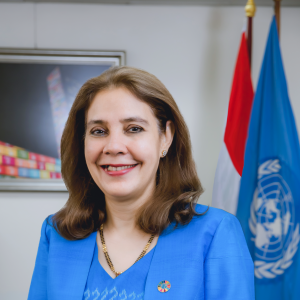Ibu Vivi Yulaswati, Deputy Minister, Bappenas
Pak Stefanos Fotiou, Director, UN Food System Coordination hub
Ambassadors, Government representatives and UN colleagues
Selamat Pagi
We come together today to accelerate Indonesia’s sustainable transformation of its food systems in line with the SDGs and climate action.
The partnerships between the Government, private sector and UN, through FAO, WFP, IFAD, and UNDP, are pivotal to this process.
Indonesia has a robust agricultural sector with the capability to ensure food security for all.
However, sustainable and climate resilient practices need to be scaled up while bolstering productivity to increase agriculture’s contribution to GDP, which currently accounts for nearly 14%.
This is especially the case as global market fluctuations exposes the country to volatility in food prices and disruptions to global supply chains.
Simultaneously, domestic food systems remain vulnerable to climatic shocks even as a third of all food is either lost or wasted, accounting for 5% of GDP.
Indonesia’s progress on the SDGs has been robust with six out of 10 indicators on track.
However, goals related to sustainable agriculture, nutrition and clean energy need acceleration as they are interlinked and impact food systems.
For instance, water stress threatens irrigation, impacting agricultural productivity.
The appointment of Ibu Retno Marsudi as the UN’s Special Envoy for Water will enable supporting integrated solutions across countries.
Diversifying food systems is also critical for food security and healthy nutrition for all.
The government’s agenda to boost agricultural production and productivity align with this goal, focusing also on traditional crops such as corn, soybean, cassava, sugarcane, sago, and breadfruit.
The President’s nutritious meal programme marks a big step forward. It will promote sustainable local production to tackle stunting for nearly 80 million infants, children and mothers within five years.
Wholesome foods produced by local farmers and cooked by local people will help meet the needs of children and pregnant women in communities.
To facilitate the nutritious meals program, a whole-of-UN approach is being brought to bear by analysing local supply chains, food safety, food diversity, bio fortification, and food loss and waste, amongst others.
We are also keen to explore the potential for a SDG bond targeting the nutritious meals programme to mobilise additional financing.
Another avenue for transforming food systems involves engaging young people from crop production to advocacy on responsible consumption.
This is critical as most Indonesian farmers are over 40 and primarily women with many lacking access to digitization.
We can leverage the vast potential of young people to spread best practices in nutritious diets, food loss and waste reduction, amongst others.
They are can also scale up digital solutions to reduce resource use and enhance efficiency.
In partnership with the Government, the UN is engaging with the national scout movement to promote their active engagement in these areas.
Indonesia has committed to transforming food availability, productivity, sustainability and governance at the food systems summit.
However, in the world’s largest archipelago there is no one-size-fits-all solution. A diversity of strategies is needed to align with regional climatic conditions.
In Sulawesi and Maluku, for instance, scaling up blue-foods such as shrimp and seaweed farming will bear transformative outcomes.
Meanwhile, in Sumatra the focus is on improving food quality in production, including organic farming.
These pathways need to emphasize climate-resilient food systems, while protecting natural resources, maintaining biodiversity and lowering emissions across the spectrum of production and consumption.
Today is an opportunity to share insights towards a unified approach and identify how we can showcase Indonesia as a convergence model at COP30.
I am very much looking forward to your insights.
Terima kasih






